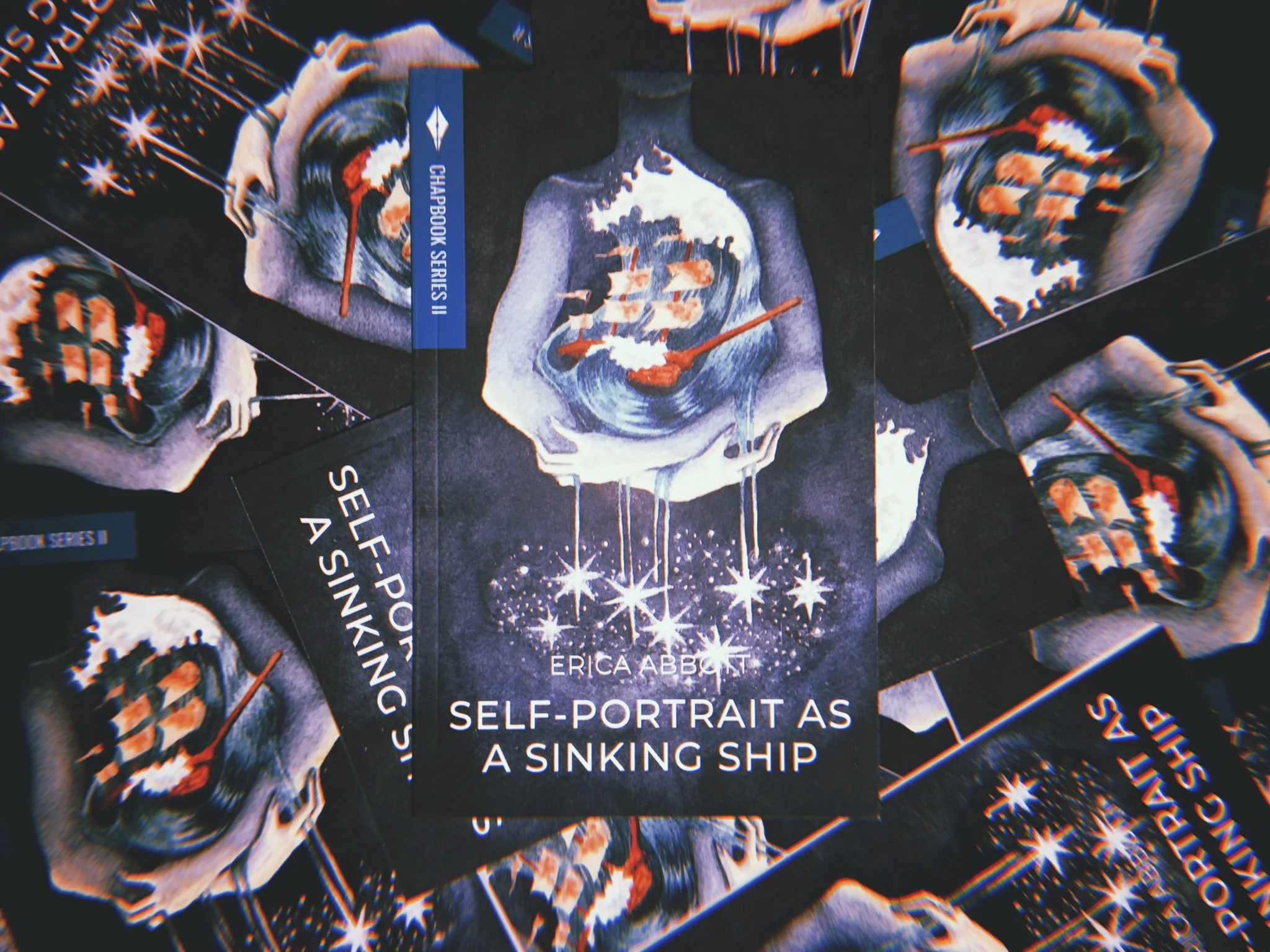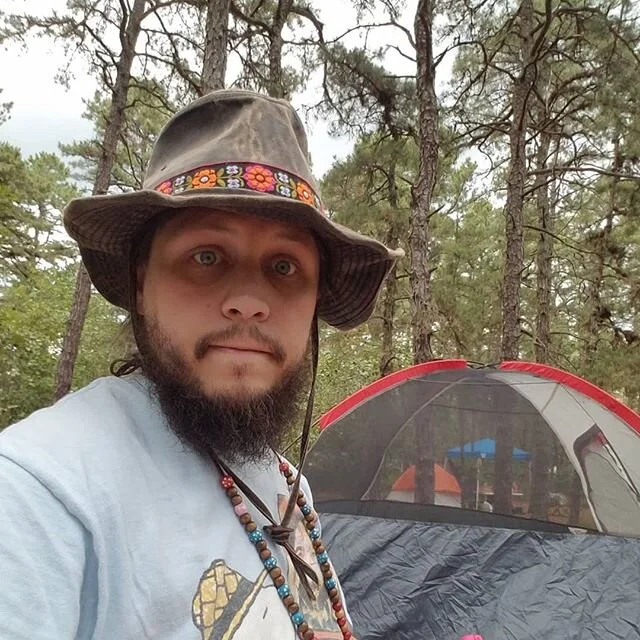How Close I Came to Breaking
(first published in Anti-Heroin Chic)
by Erica Abbott
As a child, my Saturday evenings
were spent trying not to break
the ice. They say we are all born
from stars but I imagine the skies
must have been empty the night
I was created. The paper cut on my palm
line still itches from failing to fall
in love without holding my breath;
never shouting of my infiniteness
as the car sped down Route 322. //
Mental illness has been my most
consistent friend and everyone else
is trying to get rid of it. Fires can burn
underwater. My blood is trying
to extinguish me. The Earth pulses
deep within its core. An orchestra’s
crescendo always makes me weep.
Outlining my life has been the roadmap
to my survival. Gushing red rivers
once threatened to replace saltwater seas.
A tissue can only hold so many marbles.
I wonder how many people know
just how close I came to the breaking point?
I read somewhere that you often use prompts to help you dive into your poems. Can you talk about how you choose prompts and what the creative process
is like for you?
Yes, I love using prompts! I especially like to use them when my creativity seems to hit a low point because they give such thought-provoking, perspective-bending (and sometimes even silly) jumping off points that I may have never even considered writing about without them. I also use them a lot during National Poetry Month, where for the past two or three years, I’ve challenged myself to write a poem a day so having those prompts, most of which I find through the poetry community on Instagram or the NaPoWriMo website, is crucial to getting to the end of those 30 days. In a Write or Die Tribe article from a few months ago, I wrote about how my brain just does not want to cooperate with me at times and I’ve found prompts to be one of the best solutions to that problem over the years. They really help to stretch the creative muscle and write something totally surprising at times.
You have a chapbook, Self-Portrait as a Sinking Ship, out and available pretty much everywhere. How did this chapbook evolve into its published form?Toward the end of 2019, I was really itching to start getting my work out there. I had never even submitted to a lit mag at that point and I was sort of at a loss with where to even begin. A friend sent me a call for poetry submissions on the theme of duality from Toho Journal and around the same time, I ended up finding an opportunity to do a writing coaching session through Toho Publishing. That kind of paved the way to me discovering their chapbook publishing course that spring. At that point, we were over a month into the pandemic lockdown and, after counting up my poems from over the years, I figured out that I had enough to apply for the course/chapbook publication. I applied about a week after learning about the opportunity and by summertime, I was stunned to actually have the confirmation that I was accepted into the publishing course and my words would be making their way into the world through my very first chapbook that year. Funny enough, the poem I had written and submitted for the duality issue of Toho Journal was accepted just two days before I applied. I think it really gave me a much-needed push to believe in my work and it actually ended up becoming my opening poem in the chapbook. Several other poems ended up coming from workshops I had taken early on in the pandemic, while others had been written years before and edited/polished during the publishing course. After poem selections were made, it was a matter of swapping feedback with the other poets in the course, all of whom were crucial in helping get everything together, cutting lines/poems, ordering, and finding an artist to do the cover artwork. When it finally made its way into the world in December, I was beyond ecstatic with the end result and holding the chapbook in my hands for the first time was a moment I’ll never forget!
Dual themes of darkness and hope play out through the poems in this chapbook and I think encourage the reader to set up camp on a plane of self-
acceptance. Is writing a self-care practice for you?
Absolutely. It’s the main reason I found myself coming back to poetry several years ago. I began writing poems just before I started high school, was part of the poetry club my sophomore year, and continued writing those four years. When I got to college, though, poetry kind of took a back seat. But in 2017, I lost my dog of 11 years and the reading and writing of poetry was so cathartic for me. That darkness, which very much overstayed its welcome into the following years, is what ultimately ended up bringing me back to my love of poetry and saw me through to the light moments. At the same time, I know if I’m not writing, or haven’t written in a few days/weeks, that’s okay too and is just as much a self-care practice as writing is. Sometimes a recharge is necessary and you need to step away until you’re ready for the words to come back to you (or I suppose for you to come back to the words). I know my notebook and pen are there when I’m ready. And when I am, I know it’s one of the best feelings getting those words down onto the pages. I’d be completely lost if I didn’t/couldn’t write at all and I think writing is what has helped me stay hopeful throughout those dark times in life.
I get a science fiction vibe from many of your poems. What is your relationship with the fantastic?
That’s so interesting you say that and, to be honest, it’s the first time I’ve heard that! I’ve actually joked that a few of my poems that were published in the last year have had very apocalyptic, dystopian-hellscape vibes, so it’s so interesting to consider the science fiction angle as well. I love letting my imagination run wild but I think sometimes my anxiety in general takes those imaginative/fantastic elements and gives them a bit of a darker twist haha. It’s like if I take a handful of whatever bad stuff is happening in the present and let the pen run wild, it’s bound to turn up some weird lines/unknown futures along the way, especially if it’s a free write. You just never know where a poem will journey to and those poems can sometimes end up having the strangest elements in the end.
What do you most want readers to take away from your work?
It’s going to sound extremely cliche, but I hope they feel less alone—knowing there are other people out there feeling the same exact things they are at any given moment. That even when it feels like no one is there to provide comfort, hopefully the words do. It’s one of the things that brought me back to poetry and one of the things I love most when reading a collection so I hope people see themselves in the work and feel the same way after reading a poem of mine.
Where can we buy your books/read more of your work?
Copies of Self-Portrait as a Sinking Ship can be purchased through me and a list of my published poems is on my website and when a new one is published, I’ll always share links/snippets to them on my social media as well (Instagram @poetry_erica and Twitter @erica_abbott).
Erica Abbott (she/her) is a Philadelphia-based poet and writer whose work has previously appeared or is forthcoming in Kissing Dynamite, Midway Journal, Serotonin, Anti-Heroin Chic, and other journals. She is the author of Self-Portrait as a Sinking Ship (Toho, 2020), a Best of the Net nominee, and volunteers for Button Poetry, Kissing Dynamite, and Mad Poets Society.
“Catfish” John Wojtowicz grew up working on his family’s azalea and rhododendron nursery in the backwoods of what Ginsberg dubbed “nowhere Zen New Jersey.” Currently, he works as a licensed social worker and adjunct professor. He has been featured in the Philadelphia based Moonstone Poetry series, West-Chester based Livin’ on Luck, Mad Poets Society, and Rowan University’s Writer’s Roundtable on 89.7 WGLS-FM. Find out more at: www.catfishjohnpoetry.com.



